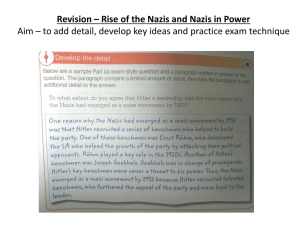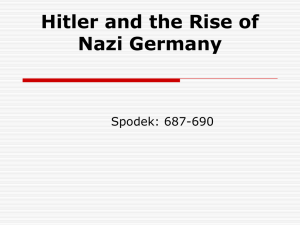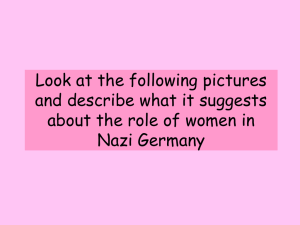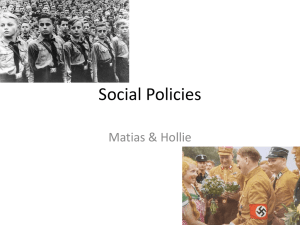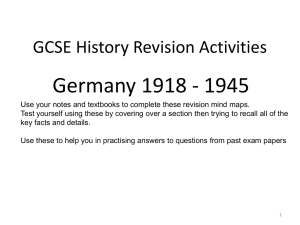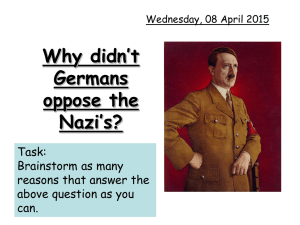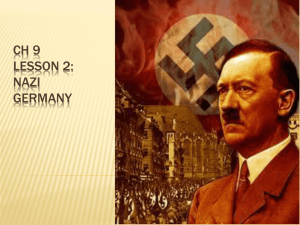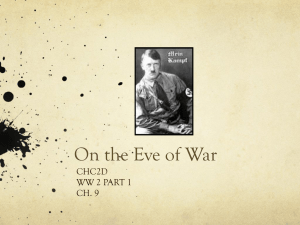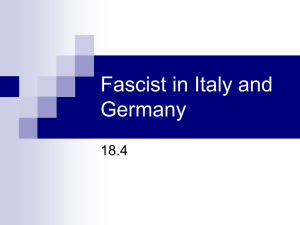The Nazis
advertisement
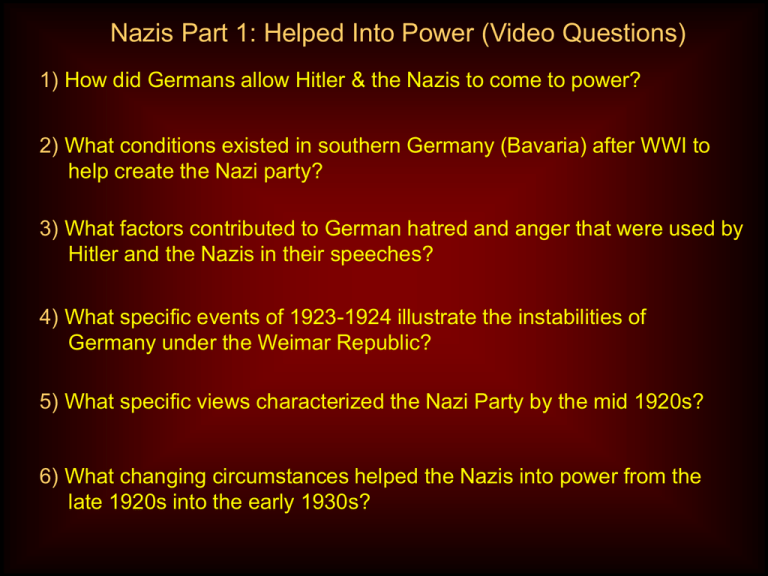
Nazis Part 1: Helped Into Power (Video Questions) 1) How did Germans allow Hitler & the Nazis to come to power? 2) What conditions existed in southern Germany (Bavaria) after WWI to help create the Nazi party? 3) What factors contributed to German hatred and anger that were used by Hitler and the Nazis in their speeches? 4) What specific events of 1923-1924 illustrate the instabilities of Germany under the Weimar Republic? 5) What specific views characterized the Nazi Party by the mid 1920s? 6) What changing circumstances helped the Nazis into power from the late 1920s into the early 1930s? Nazis Part 2: Chaos & Consent (Video Questions) 1) Hitler and the Nazis were obsessed with creating an ordered society, but in reality that order was only an illusion. Explain why & give evidence. 2) Many scholars have claimed that the Nazis brainwashed ordinary Germans. Why does this NOT accurately describe the Gestapo’s activities in the city of Würzburg? Explain. 3) Hitler avoided offering detailed policies for running the Nazi government. How then did the government operate & how was this connected to Hitler’s belief in constant competition? Explain. 4) There was a vicious battle over who controlled the mail to Hitler. How did a letter to Philipp Bouhler in late 1938 or early 1939 lead to the killing of several thousand babies & children? Elaborate. 5) One way to gain the favor of the Führer was by feeding his antisemitism. How did Joseph Goebbels’ actions in this regard lead to the deaths of 800 Jews & destruction of 1,000 synagogues in November 1938? Explain. Nazis Part 3: The Wrong War (Video Questions) 1) What does the title “The Wrong War” mean? Elaborate. 2) What specifically did Hitler admire about the British? Explain. 3) Hitler claimed that Germany wasn’t big enough. Why did he believe this & what actions did he take that were motivated by this belief? 4) After humiliating President Hacha in March of 1939, German troops entered Czechoslovakia. Why was this a significant turning point in 20th century history? 5) Hitler’s plan to invade Poland meant a war with France & Britain. Why then did he seek an alliance with Stalin in the summer of 1939? Explain. 6) Why did Neville Chamberlain go to Munich in September of 1938? What was the significance of this meeting? Explain. Nazis Part 4: The Wild East (Video Questions) 1) How did the Nazis divide & run German-occupied Poland in the first 20 months after invading in September 1939? 2) In what specific ways did Albert Forster (Danzig-West Prussia) & Arthur Greiser (the Warthegau) differ in their approach to Germanizing Poland? 3) How were incoming ethnic Germans from neighboring countries dealt with? Where did they live & work, for example? 4) The General Government of German-occupied Poland was treated like a racial dumping ground. In practice, what did this mean for millions of Poles and 3 million Polish Jews? Elaborate. 5) Who was Hans Biebow & how did he deal with the Jews in the Lodz ghetto? Explain. 6) While being tried as a war criminal in 1946, Arthur Greiser claimed that he was “acting under orders” & a “victim of Hitler’s policies.” Why is this defense simply not believable? Explain. Nazis Part 5: The Road to Treblinka (Video Questions) 1) How could such places as Treblinka ever come to exist? 2) Why was the war to the East different from the war elsewhere? Explain. Why was it a “war of annihilation”? 3) Why were Nazis in Lithuania welcomed as liberators initially? How & why did local collaborators assist the Einsatzgruppen? 4) In what specific ways did the treatment of German Jews change by September 1941? What were Heydrich’s & Himmler’s roles? 5) Although the Nazis attempted to keep the fate of the Jews secret, was it really a secret? How did most Germans react? 6) How did the death camp at Treblinka operate? Who is Samuel Willenberg? Nazis Part 6: Fighting to the End (Video Questions) 1) Why couldn’t Germany get rid of Hitler as easily as Italy disposed of Mussolini? 2) Why was the war to the East different than the war elsewhere? 3) What was the most significant attempt on Hitler’s life and how did Germans react to it? 4) In what ways did the Nazi’s racist ideology benefit almost all Germans during the war? 5) How did the Nazi ideology influence ordinary Germans’ ability to cope with losing the war? 6) What specific factors led Germans to keep fighting to the very end? The Final Solution: Part 2 (Video Questions) 1) What was purpose & significance of the meeting at Wannsee in January 1942? 2) What was the purpose of the camp at Westerbork in Holland? Describe. 3) According to survivors, what was the journey like from the ghettoes to Auschwitz? 4) How did the process of “selection” work at Auschwitz? Meaning of being sent to left or right? 5) What types of experiments did Nazis perform on inmates at Auschwitz? 6) Why is it important that we listen to survivors tell their stories? What specific characteristics make this documentary from 1973 effective? You can stop watching after the survivor plays his harmonica [53 minutes]

